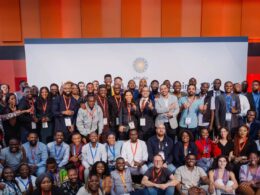The Ministry of Communication, Digital Technology and Innovation’s Girls-In-ICT (GIICT) Committee has commenced preparatory work ahead of this year’s regional training sessions for young girls across Ghana. In 2025, the program will be implemented in the Volta, Upper East, and Upper West regions, with each region set to host 1,000 girls for in-person training focused on digital skills and ICT career development.
This year’s rollout continues the Ministry’s nationwide effort to bridge the gender digital divide and foster inclusive participation in Ghana’s digital transformation agenda. The Girls-In-ICT initiative seeks to equip school-age girls—particularly those in underserved and rural communities—with foundational and advanced ICT knowledge, coding skills, and exposure to real-world opportunities in the technology sector.
Speaking at the committee’s recent planning session in Accra, Alexander Yaw Arphul, Chief Director of the Ministry, emphasized the significance of the program in fostering long-term gender equity in technology.
“The Girls-In-ICT program in Ghana is a transformative platform designed to empower young girls and women in Information and Communication Technology. It aligns with our national commitment to inclusive digital development and echoes Ghana’s broader goal of ensuring equitable access to digital skills and opportunities,” said Arphul.
The Girls-In-ICT program in Ghana is implemented under the global framework of the International Telecommunication Union’s (ITU) Resolution 70, which calls on member states to promote greater participation of women and girls in the information society.
Key Objectives of the Girls-In-ICT Initiative:
- Promote STEM Education: Encourage girls to pursue studies and careers in Science, Technology, Engineering, and Mathematics (STEM), starting from a young age.
- Bridge the Gender Digital Divide: Support digital literacy, training, and mentorship for girls to enable gender equality in the technology and innovation landscape.
- Expose Career Opportunities: Through mentorship sessions, open days, and industry visits, the program connects participants with professionals in ICT fields, giving them real-world perspectives and aspirations.
Each regional edition of the program includes a multi-phase structure: teacher training, where local educators are first trained in basic ICT modules and mentorship approaches; ICT clinics for the selected girls, covering topics such as coding, robotics, and digital safety; and an open day, where participants visit ICT companies and institutions to interact with female role models and professionals in the sector.
Over the years, the Girls-In-ICT initiative in Ghana has trained over 10,000 girls and hundreds of teachers across several regions including Greater Accra, Ashanti, Eastern, Central, Northern, and Western Regions. The program is not only empowering girls with relevant digital skills but also shaping future leaders, innovators, and change-makers in Ghana’s tech ecosystem.
In line with Ghana’s Digital Economy Policy, the Ministry’s vision is to create a digitally inclusive society where girls are not only consumers but also creators and innovators of technology. The selection of the Volta, Upper East, and Upper West regions for the 2025 training cycle reflects the Ministry’s focus on geographic equity and the empowerment of underserved communities.
Preparations are ongoing with support from key partners including the Ghana Investment Fund for Electronic Communications (GIFEC), the National Communications Authority (NCA), the Ghana-India Kofi Annan Centre of Excellence in ICT, and industry partners from the private sector.
The 2025 Girls-In-ICT celebration will culminate in regional competitions where outstanding participants will be awarded laptops, tablets, scholarships, and mentorship opportunities to further support their digital learning journey.
By investing in the digital futures of young girls today, Ghana is not only preparing them to thrive in the digital economy but also accelerating the nation’s progress toward achieving SDG 5 (Gender Equality) and SDG 4 (Quality Education).












